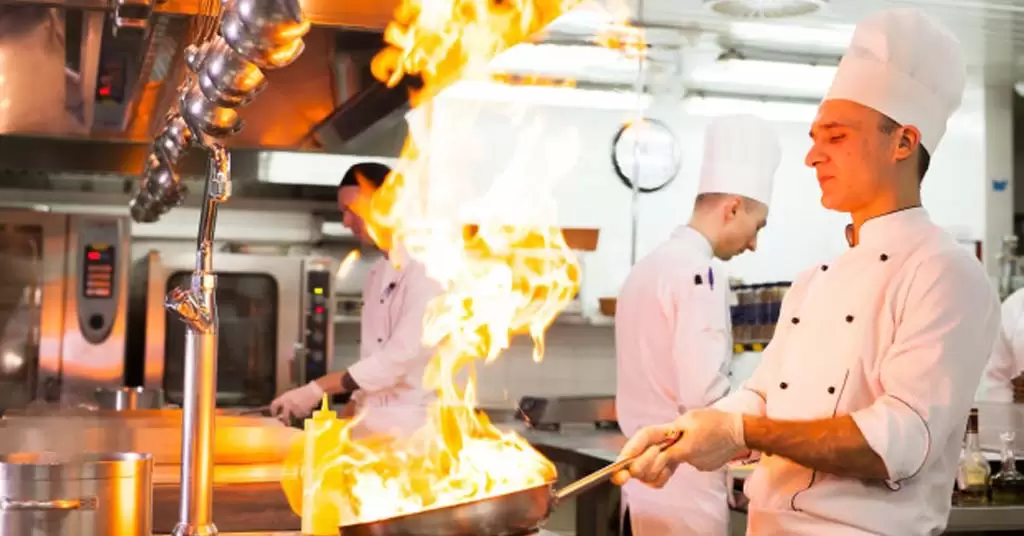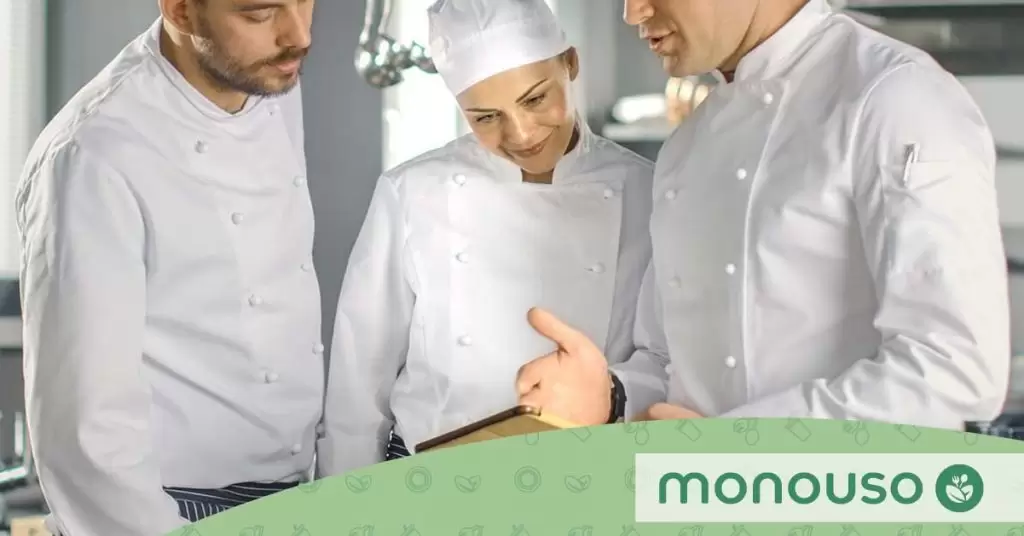Do you know the difference between a chef and an executive chef?
Are you interested in working in the kitchen of a hospitality business, but don’t know the particularities of these positions? Well, today at Monouso we will show you what are the functions of each of these professionals.Although sometimes you hear these expressions as synonyms, the truth is that there are significant differences in their functions. So, if your desire is to walk with a firm step to become a gastronomy specialist you must start with the basics:
Who makes up the kitchen team of a restaurant? Functions and professional profile of the executive chef, chef and cook
If we start from the etymological origin of the words, we will notice that chef comes from Latin and means head. Likewise, cook derives from the expression “coquina” which means to ripen by means of heat.
We can deduce then that chefs (including the executive) hold a leadership position in the kitchen, while the cook has a more instrumental rank.
Although many more people make up this team, today we will talk to you about the roles and professional profile of the Chef, Executive Chef and Cook in a restaurant kitchen:
What is an Executive Chef
If you are wondering what an executive chef or chef de cuisine does, you should know that he or she is a gastronomy professional in charge of a kitchen. It is a position with senior management responsibilities, and consequently requires years of experience and advanced preparation. It is therefore easy to understand that it occupies the highest link in the hierarchical chain.

Also, he is known as head chef, and is responsible for all operations, including the responsibility of projecting his creativity and mastery in the dishes that will set him apart from the rest.
Functions
Functions include:
- Develop recipes and menus.
- Supervise other chefs and cooks.
- Evaluate and hire kitchen staff.
- Planning staffschedules .
- Staff training.
- Calculate operating costs.
- Develop and evaluate restaurant projects.
- Selection of suppliers and raw materials.
Professional profile
In general, the professional profile Executive Chef is as follows:
- About 15 years of experience in a restaurant kitchen.
- Degree in gastronomy or similar studies.
- Ability to lead and work in a team.
- Preferably specialized in some culinary branch.
- Ability to work under pressure.
- Superior communication and interpersonal skills.
What is Chef de cuisine or Chef
Most people think that chefs and cooks are the same or have the same rank in a restaurant kitchen, since these expressions are popularly used to refer to someone who works in the kitchen in a generalized way. However, the two differ in the years of experience and level of professional training.

In other words, the chef (or chef de cuisine), is a professional accredited by a gastronomic institute (higher education of 2 – 4 years), or trained by a renowned chef. Keep in mind that this title suggests a high level of mastery by specialized studies or accumulated experience
Functions
For the achievement of corporate objectives, chefs must comply with the following:
- Train directly from the executive chef in skills and creativity.
- Support in the creation of menus.
- Control raw material inventory .
- Support in food and beverage cost analysis.
- Coordinate and supervise the cooks in charge.
- Support the work in the stations if necessary.
Professional profile
The chef or chef de cuisine must have the following profile:
- At least 5 years working in the kitchen.
- Trained in a gastronomic institute.
- Leadership and supervisory skills.
- Attitude of permanent training.
- Effective communication with your team.
What is a Cook
In a very broad sense, a cook is a person whose job is to prepare food. This expression can be extended to individuals who cook for pleasure and not for remuneration.
Contrary to what many people think, the title has nothing to do with the quality of the preparations. Keep in mind that, many cooks can make dishes of higher quality than some chefs.

In the hospitality environment, cooks are considered to be all employees who are subordinate to chefs. And in practice, they are the ones in charge of preparing the food on a daily basis rather than managing the kitchen or creating the recipes. In other words, you’ll see them at the stations running the kitchen processes.
Functions
The day-to-day work of cooks involves:
- Tocook the preparations of the day.
- Execute any action assigned by the chef in the kitchen.
- Perform maintenance and cleaning of the areas.
- Follow to the letter the executive chef’s recipes.
- Continue culinary training under the supervision of their supervisors.
Professional profile
If you want to be a cook, it is recommended that you meet the following profile:
- Interest in pursuing a career in the culinary field.
- Ability to follow instructions.
- Desire to learn food and beverage related skills.
- Ability to work under pressure and effective communication.
Differences between Chef and Executive Chef
Now that we know what the functions of these professionals in a restaurant kitchen are, we will go on to tell you the difference between these two positions:
Operation in the kitchen
As we have already mentioned, the executive chef is in charge of the kitchen and will therefore make the final decisions. In this sense, they must focus on aspects of the hospitality business that go beyond the seasons, having to delegate to their team the operational part of the preparations. For example, it is common to find him in meetings with suppliers, defining marketing strategies, drawing operating costs, etc.
On the other hand, chefs must spend much more time accompanying food preparation, since their responsibility is to supervise it. This forces them to share space with cooks and other staff members, strengthening the sense of teamwork.
Seasonal projection
This is another interesting difference, which is related to the vision of the hotel business. Both the executive chef and the chef de cuisine work with recipe preparation, menu development and restaurant dish design. However, the scope of their responsibilities varies.
This is due to the fact that the chef has the daily responsibility to translate the corporate vision and values into the preparations. In other words, there are already standardized elements that must be reproduced every day, and it is up to him to ensure that their characteristics are maintained. Otherwise, the creative signature and personality of the catering business would be at risk.
On the other hand, the executive chef is in charge of defining the changes that these elements will have over time, always taking care of the identity. To do so, he must consider the characteristics of each season, the gastronomic trends and the tastes of his clients. This is very important, since it conditions the growth or evolution of the restaurant to the criteria of the executive chef.
Leadership levels
Generally speaking, a chef implies being a leader, since regardless of rank he/she must make decisions and manage personnel under him/her. Therefore, leadership styles in both cases also tend to vary.
In the case of the chef de cuisine, he/she is usually able to influence his/her team through participation. On a daily basis, he will be accompanied by the team, side by side and sharing the rhythm of the work. This naturally favors the desire to follow him and the identity to follow instructions without major inconveniences.
The executive chef uses his legacy, and what he means as a culinary professional to the community, as a leadership foundation. In doing so, he allows the employees under him to feel that by joining him, they are part of something important. He lets them know that if everyone does their part, the restaurant will stand out from the rest and be more unique.
This highlights the importance of the chef’s career. The more outstanding your career and the greater your culinary contributions in the gastronomic sector, the easier it will be to inspire the staff to follow you.
Differences between Chef and Cook
Next we will compare the scope of the positions of chef and cook, from some essential areas of the kitchen:
Cooking stations
The difference in this space is that the cooks will be at their assigned station for the entire day. There, they will have specific tasks that respond to a given process in the kitchen.
On the other hand, the chef must be at all stations, supervising and ensuring that everything is in order. However, you may also see him temporarily at a station cooking or supporting if needed.
At the end of the day, you must remember that the chef has the responsibility to ensure that all preparations come out correctly. In addition, the reputation of the catering company depends to a large extent on his or her ability to manage the gastronomic processes.
How to approach menus and recipes
As we have mentioned, chefs are the lords and masters in the creation of recipes and menus. Creativity in this topic is an indispensable ingredient to differentiate their restaurants from the rest. Therefore, they consider this responsibility as something non-delegable and personal.
In this sense, the concept of the restaurant business, its preparations and design are managed by the chef, and from here, the cooks and other members of the team, who will be the executing arm of what has been previously shaped, come in. As a metaphor, we could say that if the menu were a clock, the chef would be the watchmaker and the cooks would be the gears.
Creative concept embodied in the dishes
The chef is the guarantor of the creative style in the final preparations, including flavors, colors and the whole final experience. This set of things is part of his vision and reputation.
Such a “creative signature” speaks to his trajectory and lays the foundation for his legacy to live on. In addition, it is an invaluable asset of the chef upon which he will build his career.
For chefs, all this represents an opportunity to create their professional identity. Therefore, it is unquestionable that a good chef leaves a great influence on the cooks that will serve them as a north to grow professionally.
Administrative process management
Cooks are focused on making sure that their meals come out as well as possible according to the standards required by their supervisor. If they achieve that goal, they will be contributing to the business meeting corporate goals.
On the other hand, the chef must focus on other aspects related to his academic training, such as marketing, costs, personnel management, purchasing and others. In addition, another characteristic that we cannot forget is leadership. Certainly, any organized group requires a leader who inspires and generates a genuine desire to be followed.
The kitchen is no exception, since without an authority figure to indicate the north to follow, everything would be a real chaos. Therefore, the chef carries the weight of the team on his shoulders, without forgetting that after all he is also a cook.
This is how we end this article on the difference between a chef and an executive chef and their roles. Share this information and encourage you to train yourself, to become a great professional in gastronomy. And remember to check other related posts, which will surely be of your interest. See you next time!

